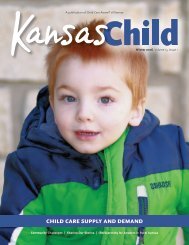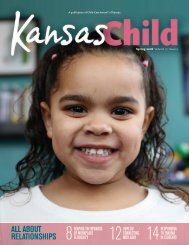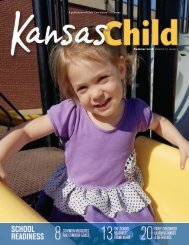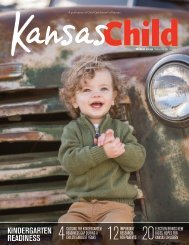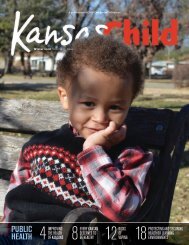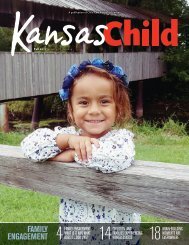2021Winter KansasChild_Final (4)
You also want an ePaper? Increase the reach of your titles
YUMPU automatically turns print PDFs into web optimized ePapers that Google loves.
Study Finds Child Care
Not Associated with
Spread of COVID-19
What is needed to reimagine the child care system post COVID-19?
• Funding. For the child care industry to survive, at least $50 billion
is needed from Congress. We do not know how long the pandemic
will last, and after it is over, higher levels of funding are critical to
creating a child care system that works for all of us.
• Data Interoperability. Accurate and timely data is essential to
identifying gaps in the child care system. We need data systems
that talk to each other across the country so that we can quickly
analyze the data when crises such as COVID-19 hit.
• Child Care Resource and Referral (CCR&R) organizations.
For years, organizations such as Child Care Aware of Kansas
have provided child care referrals to families and critical supports
to child care providers and families, especially in times of crisis.
Expanded funding for CCR&Rs would strengthen the overall
child care system.
We believe that if there is no child care, there will be no recovery from
COVID-19. However, we fear that there will be much fewer options available
because child care providers cannot handle the financial strain caused
by COVID-19.
HOW CAN YOU HELP?
• Look up your state’s data.
• Share this report with your social networks.
• Read our policy recommendations and take action today.
DIONNE DOBBINS
Sr. Director of Research,
Child Care Aware® of America
Dr. Dionne Dobbins is the Sr. Director of Research at
Child Care Aware® of America (CCAoA). She leads a team
of researchers who work closely with the policy staff to align
research reports with CCAoA’s strategic goals, including our well known
reports on the child care landscape, price of child care, and licensing.
Researchers at Yale University conducted the
first-ever, large-scale assessment of the risk
of working in child care during the CO-
VID-19 pandemic. Their findings, published
online in October in Pediatrics, the peerreviewed
journal of the American Academy
of Pediatrics, found that exposure to child
care was not associated with an elevated
risk of spreading COVID-19 from children
to adults, provided the child care programs
took multiple safety measures – including
disinfecting, hand-washing, symptomscreening,
social-distancing, mask-wearing,
and limiting group size – and were located
in communities where the spread of CO-
VID-19 was contained.
In May and June 2020, the researchers
surveyed 57,000 child care providers in all
50 states, representing more than 70% of
America’s counties, and compared self-reported
COVID-19 infections and hospitalizations
among workers whose programs
stayed open and those whose programs
closed.
The Yale research team cautioned that their
findings do not necessarily apply to adults
who work in schools or other settings with
older children. Programs for infants, toddlers
and preschoolers tend to be small, and kids
stay together. In schools and colleges, there
are usually more people in a building, and
students and teachers move more, switching
classes and moving around the building.
The study also did not investigate the effects
of COVID-19 on children in child care. It
focused only on adults working in child
care settings.
For more information, visit
www.childcareaware.org/study
www.ks.childcareaware.org
19











